中考英语复习资料(绝密)三年知识点汇总(最权威)
初中三年英语全部知识点总结-中考复习必备资料
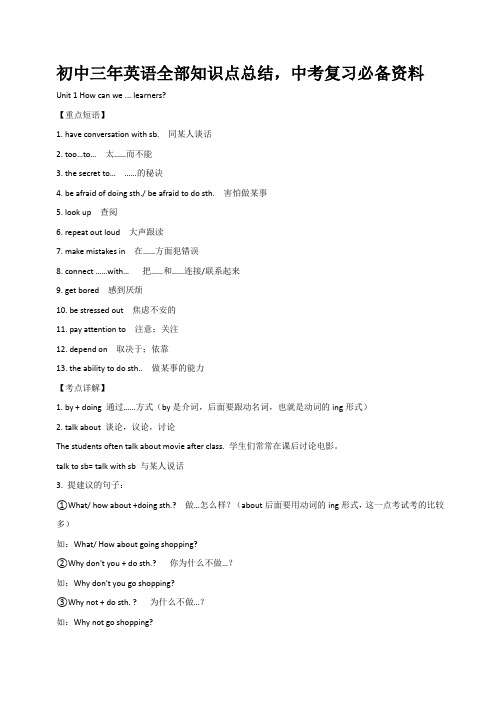
初中三年英语全部知识点总结,中考复习必备资料Unit 1 How can we ... learners?【重点短语】1. have conversation with sb. 同某人谈话2. too…to… 太……而不能3. the secret to… ……的秘诀4. be afraid of doing sth./ be afraid to do sth. 害怕做某事5. look up 查阅6. repeat out loud 大声跟读7. make mistakes in 在……方面犯错误8. connect ……with… 把……和……连接/联系起来9. get bored 感到厌烦10. be stressed out 焦虑不安的11. pay attention to 注意;关注12. depend on 取决于;依靠13. the ability to do sth.. 做某事的能力【考点详解】1. by + doing 通过……方式(by是介词,后面要跟动名词,也就是动词的ing形式)2. talk about 谈论,议论,讨论The students often talk about movie after class. 学生们常常在课后讨论电影。
talk to sb= talk with sb 与某人说话3. 提建议的句子:①What/ how about +doing sth.? 做…怎么样?(about后面要用动词的ing形式,这一点考试考的比较多)如:What/ How about going shopping?②Why don't you + do sth.? 你为什么不做…?如:Why don't you go shopping?③Why not + do sth. ? 为什么不做…?如:Why not go shopping?④Let's + do sth. 让我们做…...吧。
英语初三重点知识总结
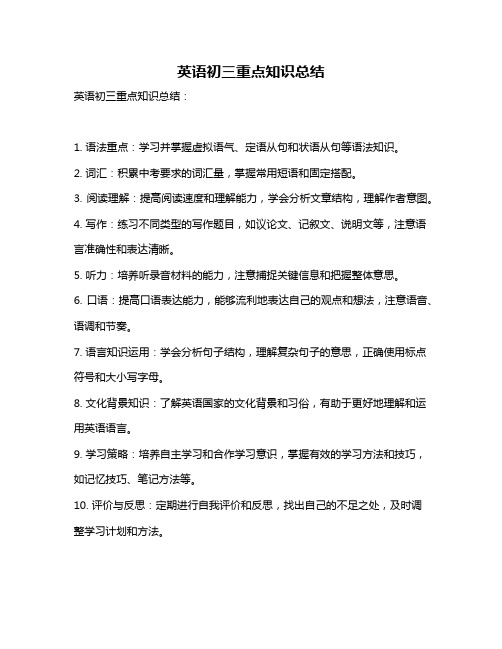
英语初三重点知识总结
英语初三重点知识总结:
1. 语法重点:学习并掌握虚拟语气、定语从句和状语从句等语法知识。
2. 词汇:积累中考要求的词汇量,掌握常用短语和固定搭配。
3. 阅读理解:提高阅读速度和理解能力,学会分析文章结构,理解作者意图。
4. 写作:练习不同类型的写作题目,如议论文、记叙文、说明文等,注意语言准确性和表达清晰。
5. 听力:培养听录音材料的能力,注意捕捉关键信息和把握整体意思。
6. 口语:提高口语表达能力,能够流利地表达自己的观点和想法,注意语音、语调和节奏。
7. 语言知识运用:学会分析句子结构,理解复杂句子的意思,正确使用标点符号和大小写字母。
8. 文化背景知识:了解英语国家的文化背景和习俗,有助于更好地理解和运用英语语言。
9. 学习策略:培养自主学习和合作学习意识,掌握有效的学习方法和技巧,如记忆技巧、笔记方法等。
10. 评价与反思:定期进行自我评价和反思,找出自己的不足之处,及时调
整学习计划和方法。
总之,初三英语重点知识总结需要全面覆盖各个领域,注重基础知识的掌握和实际应用能力的提高。
同时,要结合自身实际情况,制定科学合理的学习计划和方法,争取在中考中取得优异的成绩。
初三英语知识点笔记整理

初三英语知识点笔记整理一、词汇1、名词(1)可数名词与不可数名词:可数名词有复数形式,不可数名词没有复数形式。
例如:apple(可数)、water(不可数)。
(2)名词所有格:表示所属关系。
如:Tom's book(汤姆的书)、teachers' office(教师办公室)。
2、动词(1)时态:一般现在时、一般过去时、一般将来时、现在进行时、过去进行时、现在完成时。
一般现在时:表示经常发生的动作或存在的状态,主语是第三人称单数时,动词要加“s”或“es”。
一般过去时:表示过去发生的动作或存在的状态,动词要用过去式。
一般将来时:表示将来要发生的动作或存在的状态,常见结构有“will +动词原形”和“be going to +动词原形”。
现在进行时:表示正在进行的动作,结构是“be +动词的现在分词”。
过去进行时:表示过去某个时刻正在进行的动作,结构是“was/were +动词的现在分词”。
现在完成时:表示过去发生的动作对现在造成的影响或结果,结构是“have/has +过去分词”。
(2)动词短语:如 look after(照顾)、put on(穿上)等。
3、形容词和副词(1)比较级和最高级:形容词和副词都有比较级和最高级形式,用于比较程度的不同。
规则变化:一般在词尾加“er”“est”;以“e”结尾的加“r”“st”;重读闭音节词双写末尾字母再加“er”“est”;多音节词和部分双音节词在前面加“more”“most”。
不规则变化:如 good better best,bad worse worst 等。
(2)形容词修饰名词,副词修饰动词、形容词和其他副词。
4、代词(1)人称代词:主格(I, you, he, she, it, we, they)和宾格(me, you, him, her, it, us, them)。
(2)物主代词:形容词性物主代词(my, your, his, her, its, our, their)和名词性物主代词(mine, yours, his, hers, its, ours, theirs)。
英语初三复习资料
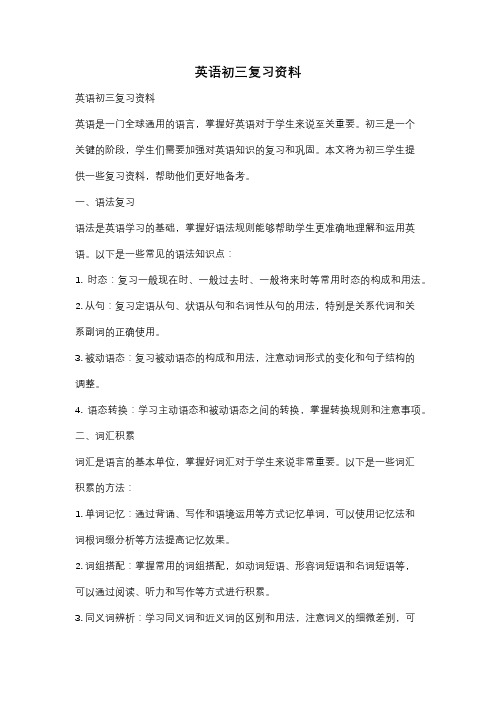
英语初三复习资料英语初三复习资料英语是一门全球通用的语言,掌握好英语对于学生来说至关重要。
初三是一个关键的阶段,学生们需要加强对英语知识的复习和巩固。
本文将为初三学生提供一些复习资料,帮助他们更好地备考。
一、语法复习语法是英语学习的基础,掌握好语法规则能够帮助学生更准确地理解和运用英语。
以下是一些常见的语法知识点:1. 时态:复习一般现在时、一般过去时、一般将来时等常用时态的构成和用法。
2. 从句:复习定语从句、状语从句和名词性从句的用法,特别是关系代词和关系副词的正确使用。
3. 被动语态:复习被动语态的构成和用法,注意动词形式的变化和句子结构的调整。
4. 语态转换:学习主动语态和被动语态之间的转换,掌握转换规则和注意事项。
二、词汇积累词汇是语言的基本单位,掌握好词汇对于学生来说非常重要。
以下是一些词汇积累的方法:1. 单词记忆:通过背诵、写作和语境运用等方式记忆单词,可以使用记忆法和词根词缀分析等方法提高记忆效果。
2. 词组搭配:掌握常用的词组搭配,如动词短语、形容词短语和名词短语等,可以通过阅读、听力和写作等方式进行积累。
3. 同义词辨析:学习同义词和近义词的区别和用法,注意词义的细微差别,可以通过阅读和写作等方式加深理解。
4. 词汇运用:通过做题、写作和口语练习等方式运用词汇,提高词汇的灵活运用能力。
三、阅读理解阅读理解是英语学习中的重要环节,通过阅读可以提高学生的语言理解能力和阅读速度。
以下是一些阅读理解的技巧:1. 理解主旨:在阅读文章之前,先预测文章的主旨和大意,帮助理清思路和抓住重点。
2. 找关键词:在阅读过程中,注意找出关键词和关键句,帮助理解文章的重点和逻辑关系。
3. 掌握词汇:遇到生词和不熟悉的词组时,可以通过上下文推测词义,或者查字典进行词汇扩充。
4. 划重点:在阅读过程中可以用笔或者记号标记重要信息和关键句,方便后续复习和回顾。
四、写作技巧写作是英语学习的重要组成部分,通过写作可以提高学生的语言表达能力和思维逻辑能力。
中考英语复习资料(2)三年知识点汇总
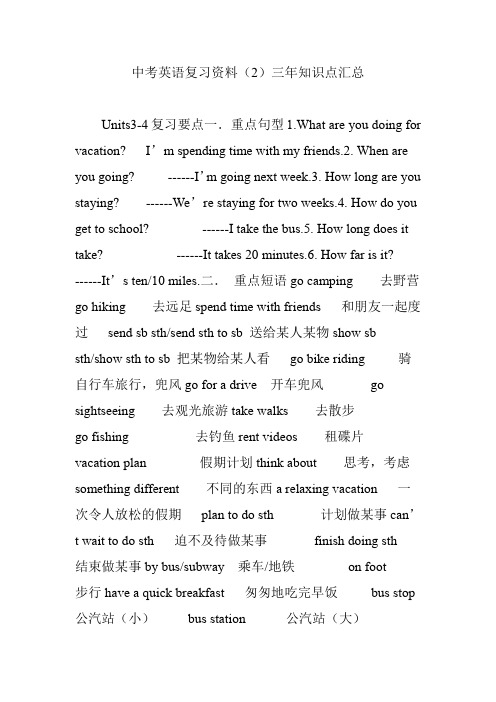
中考英语复习资料(2)三年知识点汇总Units3-4复习要点一.重点句型1.What are you doing for vacation? I’m spending time with my friends.2. When are you going? ------I’m going next week.3. How long are you staying? ------We’re staying for two weeks.4. How do you get to school? ------I take the bus.5. How long does it take? ------It takes 20 minutes.6. How far is it?------It’s ten/10 miles.二.重点短语go camping 去野营go hiking 去远足spend time with friends 和朋友一起度过send sb sth/send sth to sb 送给某人某物show sbsth/show sth to sb 把某物给某人看go bike riding 骑自行车旅行,兜风go for a drive 开车兜风go sightseeing 去观光旅游take walks 去散步go fishing 去钓鱼rent videos 租碟片vacation plan 假期计划think about 思考,考虑something different 不同的东西a relaxing vacation 一次令人放松的假期plan to do sth 计划做某事can’t wait to do sth 迫不及待做某事finish doing sth结束做某事by bus/subway 乘车/地铁on foot步行have a quick breakfast 匆匆地吃完早饭bus stop 公汽站(小)bus station 公汽站(大)be far from 远离某depend on/upon 取决于,由…决定英语中考复习时态系列之(五)一般将来时一般将来时表示将要发生的动作或存在的状态以及计划、打算做某事。
初三英语必背知识点归纳总结
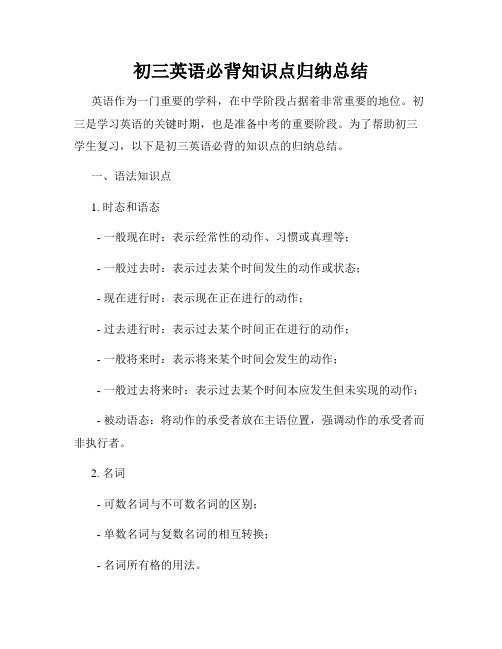
初三英语必背知识点归纳总结英语作为一门重要的学科,在中学阶段占据着非常重要的地位。
初三是学习英语的关键时期,也是准备中考的重要阶段。
为了帮助初三学生复习,以下是初三英语必背的知识点的归纳总结。
一、语法知识点1. 时态和语态- 一般现在时:表示经常性的动作、习惯或真理等;- 一般过去时:表示过去某个时间发生的动作或状态;- 现在进行时:表示现在正在进行的动作;- 过去进行时:表示过去某个时间正在进行的动作;- 一般将来时:表示将来某个时间会发生的动作;- 一般过去将来时:表示过去某个时间本应发生但未实现的动作;- 被动语态:将动作的承受者放在主语位置,强调动作的承受者而非执行者。
2. 名词- 可数名词与不可数名词的区别;- 单数名词与复数名词的相互转换;- 名词所有格的用法。
3. 代词- 人称代词、物主代词、反身代词的用法;- 指示代词和疑问代词的用法。
4. 形容词和副词- 形容词和副词的基本用法;- 比较级和最高级的构成方式;- 不规则比较级和最高级的形式;- 形容词和副词的修饰范围。
5. 介词和介词短语- 常见的介词及其用法;- 介词短语在句子中的作用。
6. 动词- 不同类型动词的用法,包括实义动词、系动词、情态动词等; - 动词的时态和语态。
7. 数词和量词- 基数词和序数词的用法;- 量词的用法。
8. 并列连词和从属连词- 并列连词的分类和用法;- 从属连词的分类和用法。
9. 特殊句型- 倒装句的形式和用法;- 感叹句的形式和用法;- 条件句和虚拟语气的用法;- 宾语从句和主语从句的用法;- 直接引语和间接引语的转换。
二、词汇知识点1. 同义词和反义词- 同义词:指意义相同或相近的词语;- 反义词:指意义相反的词语。
2. 高频词汇- 常见的高频词汇,包括常用动词、形容词、副词、名词等; - 常用短语和固定搭配。
三、阅读技巧1. 阅读理解题- 不同类型的阅读题目,包括事实细节、主旨大意、推理判断等; - 阅读题目的解题技巧和答题方法。
中考总复习英语必背知识归纳
中考总复习英语必背知识归纳一、语法知识1. 时态•一般现在时:表示经常性或普遍性的动作、状态或存在的真理;•一般过去时:表示过去某个时间发生的动作或存在的状态;•一般将来时:表示将来某个时间发生的动作或存在的状态;•现在进行时:表示现在正在进行的动作;•过去进行时:表示过去某个时间正在进行的动作;•将来进行时:表示将来某个时间正在进行的动作;•现在完成时:表示过去某个时间发生的动作对现在产生的影响;•过去完成时:表示过去某个时间发生的动作对过去某个时间产生的影响;•将来完成时:表示将来某个时间发生的动作对将来某个时间产生的影响。
2. 从句•名词性从句:充当主语、宾语、表语或介词宾语的从句;•定语从句:修饰名词或代词的从句;•状语从句:修饰动词、形容词或副词的从句。
3. 语态•主动语态:强调动作的执行者;•被动语态:强调动作的承受者。
4. 非谓语动词•动词不定式:表示目的、意图、推测、建议等;•动名词:作主语、宾语、表语等;•现在分词:作定语、状语、主语补足语等;•过去分词:作定语、表语、宾语补足语等。
二、词汇•动词:表示动作或状态的词;•名词:表示人、事物和抽象概念的词;•形容词:修饰名词或代词的词;•副词:修饰动词、形容词和副词的词;•介词:表示方位、时间、原因、目的、手段等关系的词;•连词:连接词、短语、从句的词;•代词:代替名词或名词词组的词;•冠词:限定名词范围的词;•数词:表示数量的词。
三、常用短语•in the morning: 在早上•on the way: 在途中•at night: 在晚上•on time: 按时•by bus: 乘公交车•in front of: 在…前面•by the river: 在河边•at the same time: 同时•at the moment: 此刻四、常用句型1.What do you like?2.I like swimming.3.Can you help me?4.Yes, I can.5.How often do you exercise?6.I exercise three times a week.7.What did he do yesterday?8.He played soccer yesterday.9.How long have you studied English?10.I have studied English for three years.五、常用写作模板1. 介绍性写作模板The topic of this passage/essay is ________. It mainly talks about/r eports/explains ________. According to the passage/essay, ________ is/a re discussed in detail. It offers many valuable insights into ________. This passage/essay is well-written/organized and provides a lot of use ful information about ________. In my opinion, ________. I strongly bel ieve/agree that ________.2. 议论性写作模板On the topic of ________, some people think that ________, while oth ers argue that ________. Personally, I stand on the side that ________. There are several reasons for my opinion. First of all, ________. Seco ndly, ________. Last but not least, ________. Taking all these factors into consideration, I firmly support the idea that ________.六、必备阅读材料•英语语法书:可以帮助巩固和理解英语的语法知识;•高中英语课本:内容丰富,覆盖了英语的各个方面;•中考英语真题:可以了解中考英语的题型和难度,有助于提高做题技巧。
中考英语复习资料大全
中考英语复习资料大全1. 语法篇- 动词时态:包括一般现在时、一般过去时、一般将来时等常用时态的概念和使用方法。
- 名词的单复数:研究名词的复数形式,以及一些特殊的名词变化规则。
- 代词的使用:介绍一些常见的代词及其在句子中的作用和用法。
- 形容词和副词:了解形容词和副词在句子中的修饰作用,以及它们的比较级和最高级形式。
- 介词和连词:介绍常用的介词和连词,以及它们在句子中的连接作用。
- 句子结构:研究句子的基本结构,包括主谓结构、主谓宾结构等。
- 特殊句型:介绍一些常见的特殊句型,如祈使句、感叹句、条件句等。
2. 阅读篇- 短文理解:练阅读并理解一些简短的英语文章,提高阅读速度和理解能力。
- 阅读技巧:研究一些阅读技巧,如快速扫读、略读、推测词义等,提高阅读效率。
- 阅读训练:进行大量的阅读训练,积累词汇量,提高阅读水平。
- 阅读理解题:做一些阅读理解题,锻炼对文章内容的综合理解和筛选能力。
3. 写作篇- 书面表达:研究书面表达的常用句型和写作技巧,练写作短文和作文。
- 话题写作:练根据不同话题进行写作,提高表达能力。
- 写作训练:进行写作训练,积累词汇和句型,提高写作水平。
- 作文评析:分析优秀作文和典型错误,研究写作技巧和改错能力。
4. 听力篇- 听力技巧:研究一些听力技巧,如预测选项、听懂关键信息等,提高听力效果。
- 听力训练:进行大量的听力训练,提高听力理解和反应能力。
- 听力材料:找一些中考听力材料进行听写和模拟考试,熟悉考试形式和题型。
以上是中考英语复习资料的大致范围,希望对你的备考有所帮助。
祝你取得优异的成绩!。
初三英语笔记重点归纳
初三英语笔记重点归纳初中英语是中学阶段的重要学科,对于学生的学习和进一步的升学起到了至关重要的作用。
在初三这个阶段,学生需要将前两年学到的知识进行巩固和深化,并进行一些拓展性学习,为升入高中做好准备。
因此,本篇文章将重点归纳初三英语学习中的重要知识点和笔记,帮助同学们进行复习和总结。
1. 重点知识点:语法在初三英语学习中,语法是一个非常重要的部分。
以下是初三英语语法的重点知识点:- 动词时态和语态:一定要掌握动词的各种时态和语态的用法,尤其是现在完成时、一般过去时和被动语态的应用;- 名词:要了解可数名词和不可数名词的区别,以及复数形式的变化规则;- 介词和介词短语:要熟悉各类介词的用法,特别是一些常用的固定搭配;- 从句:要掌握主从复合句的结构和连接词的用法;- 形容词和副词:要学会使用形容词和副词来描述事物、人物和动作。
2. 重点知识点:词汇词汇是英语学习的基础,充实自己的词汇量对于阅读和写作都有很大的帮助。
以下是初三英语词汇的重点知识点:- 同义词和反义词:要掌握一些常用的同义词和反义词,以便在写作中能够丰富表达;- 高频词汇:要多积累一些高频词汇,比如表示时间、原因、结果等的常用词汇;- 词根和词缀:要学会通过词根和词缀来解读和记忆单词的意思,提高自己的阅读能力。
3. 重点知识点:阅读技巧阅读是学习英语的重要环节,以下是初三英语阅读的重点知识点:- 阅读技巧:要学会利用上下文的线索来推测单词和句子的意思,同时要学会抓住文章的主旨和关键信息;- 阅读模式:要熟悉不同类型的阅读材料,比如记叙文、说明文和议论文等,掌握不同类型文章的特点和阅读方式;- 阅读速度:要提高自己的阅读速度,多做一些阅读练习,培养快速理解和分析的能力。
4. 重点知识点:写作技巧写作是英语学习的另一个重要方面,以下是初三英语写作的重点知识点:- 句型和句式:要学会使用多种句型和句式,使文章更加丰富多样;- 衔接词汇:要学习使用一些衔接词汇,使文章的结构更加清晰流畅;- 逻辑表达:要使文章的逻辑关系合理,思路清晰;- 注意拼写和标点:要注意拼写和标点的正确使用,提高文章的可读性。
初三英语升中考知识点总结
初三英语升中考知识点总结一、词汇与短语1. 不规则动词的过去分词变化及其用法2. 动名词的构成及其用法3. 固定搭配短语的用法4. 名词单复数的变化规则及特殊情况5. 代词的用法及其不同类型的变化6. 连词的分类与用法7. 介词短语的用法8. 常见形容词的比较级与最高级形式9. 常见副词的比较级与最高级形式二、语法1. 时态的构成及其用法2. 被动语态的构成及其用法3. 语态的转换4. 比较级与最高级的构成及其用法5. 虚拟语气的构成及其用法6. 直接引语和间接引语的转换7. 定语从句和状语从句的构成及其用法8. 名词性从句的构成及其用法9. 特殊疑问句的构成及其用法10. 否定句的构成及其用法11. 同位语的构成及其用法12. 不定式的用法及其特殊形式13. 分词的构成及其用法三、阅读理解1. 根据上下文猜测词义2. 根据语境判断句子的意思3. 理解作者的观点与态度4. 推断文章的主题与要点5. 判断文章的结构与篇章关系6. 小品文阅读理解7. 议论文阅读理解8. 报刊杂志的阅读理解9. 广告的阅读理解四、写作1. 书面表达中的语言运用2. 写作时的逻辑思维3. 写作中的表达技巧4. 写作中的修辞手法5. 写作中的综合训练6. 作文题型的应对策略五、口语1. 听力训练的技巧2. 对话练习的方法3. 口语表达中的习惯用语4. 口语表达中的连读现象5. 交际用语的应用6. 场景练习与模拟对话7. 口语表达中的语音语调六、听力1. 考试要求下的听力技巧2. 听力材料的主题和内容3. 听力材料中的重要细节4. 听力材料中的逻辑关系5. 听力材料的篇章结构6. 听力材料中的重点句子和重点词语7. 听力材料的推理和判断七、阅读1. 阅读中的速度与理解2. 阅读中的文章主题及段落大意3. 阅读中的文章细节及信息点4. 阅读中的篇章结构与逻辑关系5. 阅读中的语言表达与修辞手法6. 阅读中的推理与判断7. 阅读中的文学常识八、写作1. 写作中的提纲与结构2. 写作的篇章逻辑和语言表达3. 写作的综合运用与应对4. 写作中的修辞手法与表达技巧5. 写作中的分类与举例6. 写作中的推理与抒情7. 写作中的议论与记叙九、翻译1. 翻译中的语言基础2. 翻译中的语言技巧3. 翻译中的文化背景4. 翻译中的句式转换5. 翻译中的习惯表达6. 翻译中的主题概括7. 翻译中的意义表达十、语法1. 时态、语态、语气、语氛2. 词类与构词3. 句型与句法4. 从句与主从关系5. 连词、介词、代词、冠词6. 形容词、副词、比较级与最高级7. 不定式、分词与非谓语动词8. 虚拟语气与主谓一致9. 词义与语境10. 句子成分与句子结构以上是初三英语升中考知识点总结,希朋友们能够认真复习,取得优异成绩。
- 1、下载文档前请自行甄别文档内容的完整性,平台不提供额外的编辑、内容补充、找答案等附加服务。
- 2、"仅部分预览"的文档,不可在线预览部分如存在完整性等问题,可反馈申请退款(可完整预览的文档不适用该条件!)。
- 3、如文档侵犯您的权益,请联系客服反馈,我们会尽快为您处理(人工客服工作时间:9:00-18:30)。
九年级中考复习资料Unit1-Unit 2重点句型1.—My name’s Jenny. —I’m Gina. Nice to meet you.2. —What’s your/his/her name? —My/His/Her name is … .3. What’s your/his/her family/first name?4.—What’s your telephone number? —It’s 218-9176.5. What’s his/ her telephone number?6. —What’s this/that in English? —It’s a ruler.7. —Is this/that your pencil? —Yes, it is./No, it isn’t.8. How do you spell pencil?/Spell pencil./Can you spell pencil?9. Is that your computer game in the lost and found case?10. Call Alan at 495-3539.重点语法be在一般现在时中的基本用法:I用am, you用are,is跟着他她它。
He ,she ,it用is,we, you they都用are。
单数名词用is,复数名词都用are。
be的几种形式:is, am, are —being —was, were —been主谓一致:主谓一致的15种常考情况:1.表示时间,重量,数目,价格,长度,数学运算等的词或短语作主语时,尽管他们是复数形式,但如果把这些复数形式的词或短语看作是一个整体,谓语动词用单数形式。
Two months is quite a long time. Twenty dollars is enough.2.动词不定式,动名词,从句或不可数名词作主语时,谓语动词用单数。
To see is to believe. It is not easy to master a foreign language.3.由and连接两个成分作主语时,要根据其表示的意义来决定谓语动词的形式。
如果其表示的是一个整体的概念或指的是同一事物,谓语动词用单数,如果其表示的是两个不同的对象时,谓语动词用复数。
The writer and the teacher are coming.The poet and teacher is one of my friends.4.集合名词people,police一般看作复数意义,其谓语动词用复数。
另外一些集合名词family,enemy,class,army等作主语时,谓语动词是用单数还是复数,要根据这些词在句中的实际含义而定。
当他们表示的是整体意义时,谓语用单数;当他们强调个体成员时,谓语动词用复数形式。
In England, people eat fish and chips.The Chinese people(民族)is a great people.5.名词性物主代词mine,yours,his,hers,its,ours,theirs等作主语时,谓语动词的数取决于该代词所表示的意义是单数还是复数。
His parents are young, but mine are old.6.以s结尾的名词本身不表示复数意义时,谓语动词通常用单数形式,如news,physics,politics,maths等。
No news is good news. Physics is the most difficult subject for him.7.由or,either…or…,neither…nor…,not only…but also…等词连接名词或代词作主语时,谓语动词的数和最接近的主语一致。
Neither you nor Li Hua has been to Shanghai before.8.以there,here开头的句子,若主语不止一个,其谓语动词的形式和邻近的那个主语一致。
There is a table and four chairs in the room.Here are some books and paper for you.9.trousers,clothes,glasses,compasses,chopsticks等作主语时,谓语动词用复数。
但如果前面有a pair of短语时,谓语动词用单数。
Jim’s trousers are brown. The pair of glasses is Mr. Green’s.10.由“a lot of/lots of/plenty of+名词”或“分数+名词”作主语时,谓语动词的单复数根据名词的单复数而定。
A lot of people have been to London.Three-fifths of the water is dirty.11.“a number of +复数名词”作主语时,谓语动词用复数;“the number of+复数名词”作主语时,谓语动词用单数。
A great number of birds fly to the south in winter.The number of lions does not change much if people leave things as they are.12.代词something,anything,nothing,everyone,anybody,nobody,each,neither,either,little,much,one等作主语时,谓语动词用单数形式。
Neither of us is a boy。
Each of them has an English dictionary。
One of the students was late for school。
13.All,some none,most,any等代词作主语时,若其指复数概念,谓语动词用复数形式;若其指单数形式,则谓语动词用单数形式。
Not all work is difficult。
Not all the students are here。
14.有些形容词前面加上定冠词the,如the poor,the old,the yong,the rich,the dying等用来表示一类人时,主语为复数意义,谓语动词用复数。
The old are good taken care of。
15.Many a意为“许多”,但因后面跟的是单数名词,谓语动词应用单数形式。
Many a student has passed the exam。
练习:1.The news for my brother。
A. areB. wereC. beD. is2.A boy with two dogs when the earthquake rocked the city。
A. were sleepingB. is asleepC. was sleepingD. are asleep3.Everyone except Tom and John there when the meeting began。
A. areB. isC. wasD. were4.Neither he nor I from Canada。
We are from Australia 。
A. isB. areC. amD. be5.Jim works hard on his Chinese and 。
A. so Lucy doesB. so is LucyC. so does LucyD. so Lucy is6.Jenny and her parents going to visit the Palace Museum tomorrow。
.A. isB. amC. areD. be7.Henry,with his friends,volleyball every afternoon。
A. playB. playsC. has playedD. have played8.Fish and chips the most take—away food in England。
A. areB. isC. wereD. was9.My family early in the morning。
A. getB. getsC. has gotD. have got10.Maths my favorite subject。
A. beB. isC. amD. are11. How time flies! Three years really a short time.A. isB. areC. wasD. were12. liu Xiang and Yao Ming are world-famous sports stars. Of them are the pride of China.A. BothB. NeitherC. AllD. None13. –Are the twins on the football team?-No, neither of them on the team.A. isB. areC. wereD. be14. Not only his parents but also his grandfather to a lot of places of interest in our country since hey came here.A. has goneB. has beenC. have goneD. have been15.There are enough in the fridge. We don’t need to buy any.A. milkB. tomatoesC. tomatosD. apple16. A report says hundreds and thousands of trees in the Amazon rainforest last year.A. was cut downB. have been cut downC. were cut downD. had been cut downUnits3-4 复习要点1、介绍家庭成员This/That is my sister/brother/mother…These/Those are my parents/grandparents…Is this/that your sister/brother…? Yes, it is./No, it isn’t.Are these/those your parents/grandparents…?Yes, they are. /No, they aren’t.There are 3/4/5 …people in my family. They are my father, my mother,…and I.2、关于方位介词或短语表方位的介词或短语有:in,on ,under,behind,near,next to,in front of,across from,…My book is on my desk, my pen is in my book…Where is the backpack/pencil…? It’s in/on/under….Where are the books/pens/balls…? They are in/on/under….3、把…带去给某人take …to e.g:Please take these things to your sister.把…带来给某人bring…to e.g:Can you bring my homework to school?二、代词 ( 有两种:人称代词和物主代词。
